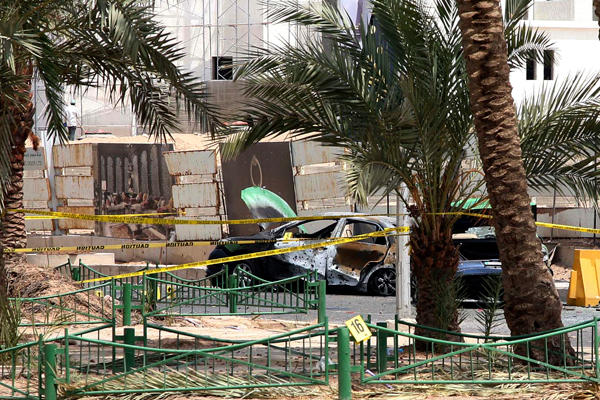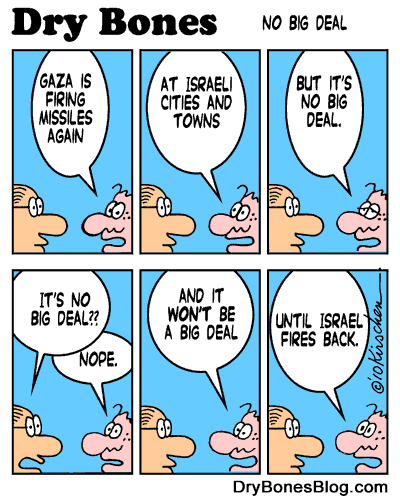![]()
Sun, Aug 15, 2010 | The Meir Amit Intelligence and Terrorism Information Center

Car in the Jordanian city of Aqaba destroyed by a rocket fired from the Sinai Peninsula (Photo: Ibrahim Farajian for Reuters, August 2, 2010)
Hamas operatives were responsible for the two rocket attacks on Eilat and Aqaba. The Egyptian media strongly attacked Hamas and Iran because of the rocket fire, calling Hamas an “Iranian agent” and demanding it be punished
Overview
1. According to Israeli information and reports from Egyptian and Palestinian sources, a squad of Hamas’ military wing, the Izz al-Din al-Qassam Brigades, was behind the two rocket attacks on the southernmost Israeli city, Eilat and the Jordanian city of Aqaba carried out this past year from the Sinai Peninsula. Hamas did not admit responsibility for either attack, denying it outright in the last incident to moderate the damage done vis-à-vis Egypt and Jordan.
2. The two rocket attacks on Eilat and Aqaba:
A. On August 2, 2010, six 122mm Grad rockets were fired at Israel from the Sinai Peninsula. Three fell on the city of Eilat (one in a drainage pool in the northern part of the city). There were no casualties (IDF Spokesman, August 2, 2010). Two rockets fell in Aqaba in front of the Intercontinental Hotel. A Jordanian civilian was killed and five were injured, one of them seriously. One rocket fell into the sea.
B. On April 22, 2010, three 122mm Grad rockets were fired at Eilat and Aqaba from the Sinai Peninsula. One was identified as falling into the sea south of Eilat and another fell in Jordanian territory. Two days later the third rocket was found by divers at a depth of 30 meters, or 33years, and brought up out of the sea about 70 meters, or 76 yards, from the Eilat shore (IDF Spokesman, April 24, 2010).
3. In both instances Hamas fired 122mm standard Grad rockets, which in our assessment were provided by Iran. For the most part, rockets are smuggled into the Gaza Strip through the network of tunnels between the Strip and Egypt. The Egyptian media accused Iran of responsibility for the attack, carried out by Hamas and a series of subcontractors exploiting Iranian funds and whose income comes from smuggling.
4. It can be assumed that rocket-launching squads are sent from the Gaza Strip to the Sinai Peninsula to fire rockets at Eilat and Aqaba for the following reasons:
A. Hamas’ Izz al-Din al-Qassam Brigades want to extend their terrorist activities beyond the borders of the Gaza Strip, Judea and Samaria to challenge Israel, Jordan and Egypt while adopting a policy of restrained attacks from the Gaza Strip. That is because of Israel’s deterrent power and Hamas’ administrative concerns, while in Judea and Samaria Hamas finds it difficult to operate because of the counterterrorism activities carried out Israel and the Palestinian Authority’s security services.
B. Hamas wants to disrupt the peace process, especially the possibility of direct talks, and to take revenge for Israel activities. In a speech made by Khaled Mashaal, head of the Hamas political bureau in Damascus, on the last day of a summer camp run by Ahmed Jibril’s Popular Front for the Liberation of Palestine, he stressed the importance of jihad and the armed struggle, and rejected the legitimacy of Israel’s existence and negotiations with it.
5. In our assessment, the glaring contradiction between rocket fire carried out by Hamas’ Izz al-Din al-Qassam Brigades and the denials of the Hamas leadership in the Gaza Strip reflects an internal schism in Hamas concerning the advantages of carrying out such attacks from the Sinai Peninsula (and perhaps also regarding the advantages of the restrained rocket fire policy adopted in the Gaza Strip since Operation Cast Lead).
6. The Hamas rocket fire from the Sinai Peninsula is a clear violation of the sovereignty and interests of Egypt, with which Hamas has no desire to worsen its already tense relations (it was not by chance that Egypt strongly criticized the rocket fire). Hamas treats the Sinai Peninsula like a no man’s land. Jordan, beyond the casualties, also suffered damage to its economy and image: large amounts of money have been invested in tourism have been invested in Aqaba.
Reactions to the Rocket Fire from the Sinai Peninsula
Israel
7. Israeli Prime Minister Benyamin Netanyahu stated that Israel had investigated both attacks against it and determined that without a doubt both had been carried out by a Hamas squad belonging to the Izz al-Din al-Qassam Brigades, Hamas’ military wing (Israeli Foreign Ministry website, August 4, 2010).
Egypt
8. Immediately after the incident, the Egyptians rushed to deny that the rockets had been fired from the Sinai Peninsula (Al-Nahar website, August 2, 2010). However, they later admitted that seven rockets had been fired simultaneously from the Taba region, accusing Hamas (with Iranian instigation) of responsibility.
9. In an exceptional move he Egyptian media, especially the establishment media, attacked both Hamas and Iran strongly and extensively. For example:
A. According to an August 5 editorial by Muhammad Ali Ibrahim, editor-in-chief of Al-Gomhuriyya (quoted by Al-Quds Al-Arabi on August 6), the Palestinians in the Gaza Strip have the right to behave as they please toward Hamas, even when its operatives have been proved to be “uncontrolled butchers.” However, Egypt will not agree on any terms to have Hamas operatives trespass its borders “on the orders of their Iranian masters” to fire rockets at Israel. Their infiltration into the Sinai Peninsula violates Egyptian interests, sovereignty and national security. Egypt will not agree that its sons are again martyred by the “loathsome gang” which pretends to be a “resistance movement.” Egypt has the right to strike with an iron fist those disreputable individuals who were nurtured in the bosom of treachery and back-stabbing. “Anyone who sprays us with water will be sprayed in return with blood.”
B. According to a two-part article by Muhammad Ali Ibrahim [published on August 7 and 8] called “Patience has its limits,” Hamas, “the agent of Iran,” no longer had an excuse to attack Egypt the Rafah crossing was opened following the “tragedy of the freedom convoy.” Iran, which is trying to harm Egypt, instructed Hamas “or a sector within it” to infiltrate from the Gaza Strip into the Sinai Peninsula and to fire rockets at Israel. That was done to complicate Egypt’s relations with Israel and embarrass Egyptian President Hosni Mubarak while he was holding talks with the of the Israeli government. In addition, Iran wants to push the Arab countries into conflicts with Israel and set the region on fire, even at the price of those countries’ sovereignty. According to the article, there is a limit to Egypt’s patience, and the “gang of murderers” called Hamas should be punished and revenge taken. Egyptian should also terminate, once and for all, its relations with Hamas and not discuss a reconciliation, or easing the siege and suffering.
C. The August 6 editorial of Osama Saraya, the editor-in-chief of Al-Ahram, denounces the organizations which claim they are religious and take their slogans from Iran. “The new game” of rocket fire from Egyptian territory targeting Eilat and Aqaba is a “great crime,” which without a doubt will motivate Egypt to change its relations with Hamas in the Gaza Strip. Hamas does not have the right to get Egypt, which supported it and the Palestinians, involved in a new military conflict with Israel. Hamas and its allies should know that they have broken all the rules and conventions and that the time has come to “settle accounts,” and that the price will be high. According to the editorial, Hamas uses subcontractors operating in the Gaza Strip in cooperation with smugglers on the Egyptian, Palestinian and Israeli sides, whose income comes from Iranian funds. They were behind the recent rocket fire, and their intention was to make a statement while avoiding an Israeli reprisal. Those are not “resistance” activities but political acts whose objective is to cause tensions between Egypt and Israel, to lead to conflicts between the two and to send a message of their rejection of the [peace] negotiations.
Hamas
10. Official Hamas sources were quick to deny the movement’s involvement in the rocket fire from the Sinai Peninsula, and stressed that Hamas, like all the other Palestinian organizations, only operated from within Palestinian territory:
A. Salah al-Bardawil, spokesman for the Hamas faction in the Palestinian Legislative Council, said he doubted that rockets had been launched at Eilat and denied the involvement of Hamas in launching them, saying that Hamas did not want war. He accused Israel of looking for excuses to justify what he called its “aggression” against the Gaza Strip (Hamas’ Palestine-info website, August 2, 2010). On another occasion he said that Israel’s version of the rocket fire was a “lie” and that the rocket fire came from IDF forces which had been training in the area. He claimed that Hamas’ strategy was not to use any Arab territory and to concentrate the efforts of its “resistance” in Palestinian territory (Hamas’ Palestine-info website, August 4, 2010).
B. Musheir al-Masri, secretary of the Hamas faction in the Palestinian Legislative Council, said that Israel had invented the incident as an excuse to attack the Gaza Strip and that Hamas did not want a confrontation with Egypt or Jordan (Radio BBC, August 4, 2010).
C. Taher al-Nunu, spokesman for the de facto Hamas administration, said that Hamas was of the opinion that no Palestinian organization was behind the rocket fire, because those organizations operated inside Palestinian territory. He added that Hamas had no intention of embarrassing Egypt (Al-Arabiya TV, August 4, 2010).
D. Abu Obeida, spokesman for Hamas’ military wing, denied any connection with the rocket fire and claimed that the activities of the Izz al-Din al-Qassam Brigades were bounded by the borders of “historical Palestine.” He added that when the Izz al-Din al-Qassam Brigades fired rockets they did not hesitate to claim responsibility (Al-Qassam website, August 5, 2010).
11. Hamas’ political bureau was quick to send a message to the Jordanian government though intermediaries stating that Hamas was not connected to the rocket fire, and warned Jordan against “an Israeli-Egyptian attempt to exploit the rocket fire for political objectives.” Khaled Mashaal, head of the Hamas political bureau in Damascus, sent a similar message to Jordan (Al-Quds Al-Arabi, August 7, 2010).
The Hamas Daily Paper Felesteen Supports Rocket Fire from the Sinai Peninsula
12. In direct contradiction of the Hamas stance, and of the remarks of Salah al-Bardawil in particular, Mustafa al-Sawaf, former editor of the Hamas daily Felesteen, wrote an editorial for the paper praising the rocket fire from the Sinai Peninsula. He noted that it was a step in the right direction, because the “resistance” [i.e., terrorism] did not have to be carried out only from the territory of “Palestine.” He said rocket fire at Eilat was an example of the support the “Palestinian resistance” received from neighboring regions and that it should continue. He mentioned four arenas where, in his opinion, the “resistance” should take place: the West Bank, the Gaza Strip, the territory of the State of Israel and what he called “outside Palestine,” that is, regions like the Sinai Peninsula (Hamas’ daily Felesteen, August 3, 2010).
Reactions from Sources in Fatah
13. According to Fatah sources, Ra’ed al-Atar, commander of the Izz al-Din al-Qassam Brigades for the Rafah region, was responsible for dispatching the squad to the Sinai Peninsula and for giving the order to launch the rockets. According to the sources, the rockets were launched with the knowledge of Khaled Mashaal, who authorized the attack, and Iranian intelligence, which instigated it. The sources further claimed that it was carried out without the knowledge of Ahmed al-Jaabari, commander of the Izz al-Din al-Qassam Brigades in the Gaza Strip, and of senior Hamas figures who oppose firing rockets from Egyptian territory on the grounds that such activities will damage relations with it (Saqour, news site affiliated with Fatah, August 6, 2010).



 RSS
RSS











Egyptian Media: Hamas is an Iran Agent and Needs to be Punished #egypt #israel #hamas http://j.mp/9vM89w
RT @CrethiPlethi: Egyptian Media: Hamas is an Iran Agent and Needs to be Punished #egypt #israel #hamas http://j.mp/9vM89w
RT @CrethiPlethi: Egyptian Media: Hamas is an Iran Agent and Needs to be Punished #egypt #israel #hamas http://j.mp/9vM89w